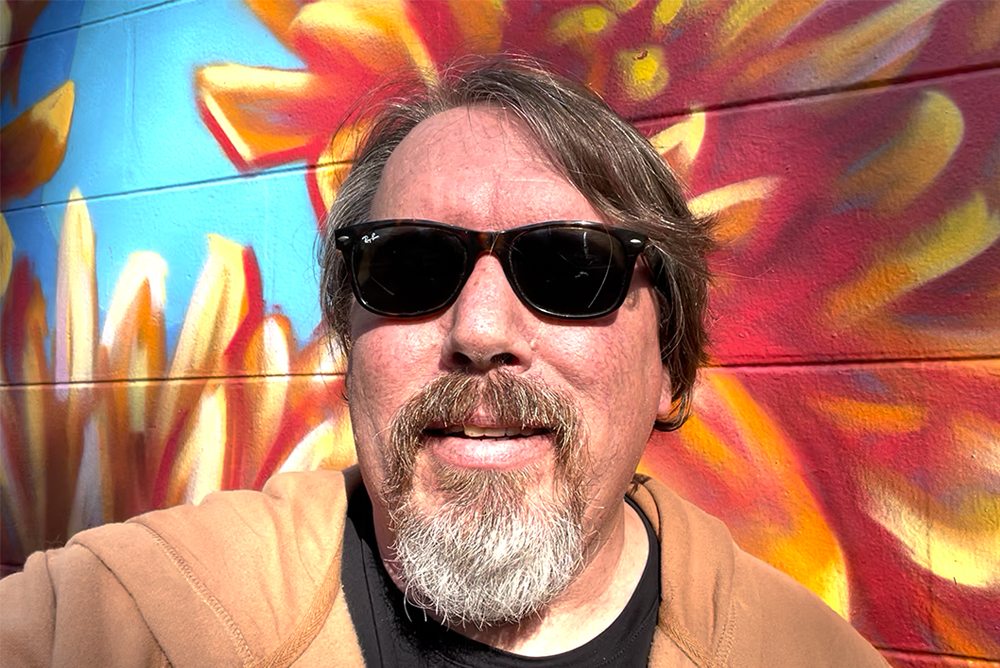
Courtesy of Brian Turner.
Brian Turner is a poet and memoirist who served seven years in the U.S. Army. The author of two poetry collections, Phantom Noise and Here, Bullet, he is also the editor of the anthology The Kiss and the recent memoir, My Life as a Foreign Country. As Zócalo’s first guest poetry curator for the 2022 Poetry Curator Series, he highlighted four poems in translation. We got a chance to chat with Brian in the green room, who told us about how he procrastinates with his dog (don’t we all?), painting with rice paper and ink, and the last poem that moved him.
Which poets influenced you?
Someone like Philip Levine is right there at the top of the list. I studied with him at Fresno State. There was also Corrinne Clegg Hales. There are things from her about line breaks, lineation, and the craft itself that I’m constantly sharing with others as they’re finding their way into the art form.
But if I went deeper, foundationally, I’d find someone none of you had ever met, unfortunately—my best friend, Brian Voight. I knew him all throughout his life. He died of cancer in 2012. We were like brothers. Our conversations over the years [touched on the] basic and huge questions that are relevant throughout our lives as artists and just as human beings.
What is your guilty TV pleasure?
Late night stand-up comedy. Every time there’s a special or an episode, I see it as much as possible, and then I go back and re-watch it to see how they wove together their set.
What’s your comfort food?
How much time do we have? Today it was chili with cornbread, but my go-to is probably tamales. I’m from California, and it’s harder to find really good tamales here [in Florida], but I’ve got a hook-up now.
What was the last thing that inspired you?
Dorianne Laux’s poem “She.” It’s a profoundly moving poem that focuses on a very small moment in human history—someone crossing a street, sort of marooned in the roadway, at the end of their tether, in a sense. A Samaritan, unlike the others in their cars honking, goes out to help her, to hold her in his arms when she nearly collapses, to help her to the other side. It’s such a beautiful gesture and such a quiet poem.
As a child, what did you want to be when you grew up?
The first thing I wanted to be was a historian. I think historian stuck with me because memory and history are so integral to our lives as a whole.
How do you procrastinate?
I play with my dog, which I don’t think is procrastinating—it’s a good thing, she wants me to play with her. What am I procrastinating from? Usually, it’s from one art form to another that’s pulling me. I’m working on a book, but I’m also working on an album of music, so sometimes I’ll get really excited about one, but there’s a deadline on the other. When I fight it, I usually end up not making my best work, but when I follow that impulse—I think when we’re compelled by imagination to do something, that’s when we can be surprised the most.
What language would you most like be able to pick up?
I think it would be Russian. I say that because I believe if I keep working hard at Spanish, I can get better. But if someone can wave a magic wand, and I can just speak Russian, then I can keep working on Spanish.
Do you have any hidden talents?
I like to paint with rice paper and ink grounded from stone. Because the paper has its own intentions with the ink, you can’t necessarily control it. After coming back from Iraq, it was a way I could slow my mind down a bit and practice a form of patience and meditation. There’s also a ceding of control, from a perfectionist mode, which allows the art to surprise me.
Where do you write?
In here. [He points to his head.] Inside my body. A few days ago, I was writing in my backyard, with my notebook open, and thinking of how the poem was coming to me, but it would start and stop. I remember thinking that sometimes we are sort of transport vehicles and poems come through us. If we’re able to listen enough to the imagination, we can help them arrive into language, whether spoken or on the page. The body wants music while the brain wants story—history and layers and rhetorical structures. We’re somewhere in the swirling stellar structure of that.



